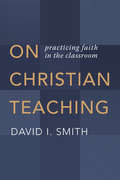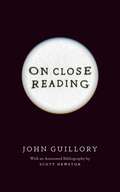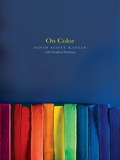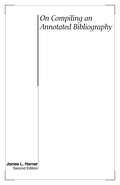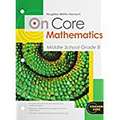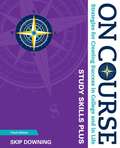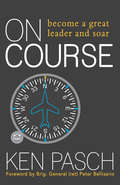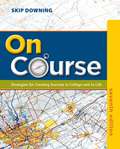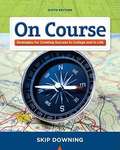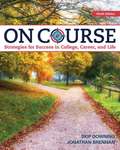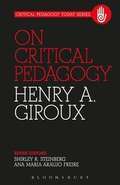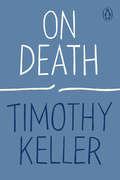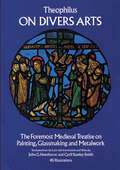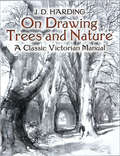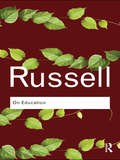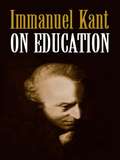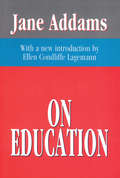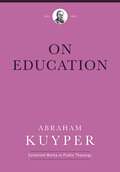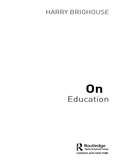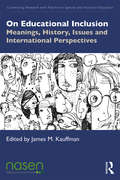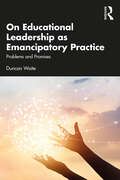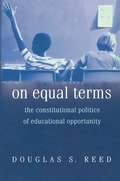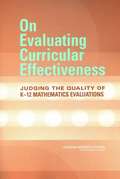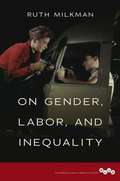- Table View
- List View
On Christian Teaching: Practicing Faith in the Classroom
by David I. SmithChristian teachers have long been thinking about what content to teach, but little scholarship has been devoted to how faith forms the actual process of teaching. Is there a way to go beyond Christian perspectives on the subject matter and think about the teaching itself as Christian? In this book David I. Smith shows how faith can and should play a critical role in shaping pedagogy and the learning experience.
On Close Reading
by John GuilloryJohn Guillory considers close reading within the larger history of reading and writing as cultural techniques. At a time of debate about the future of “English” as a discipline and the fundamental methods of literary study, few terms appear more frequently than “close reading,” now widely regarded as the core practice of literary study. But what exactly is close reading, and where did it come from? Here John Guillory, author of the acclaimed Professing Criticism, takes up two puzzles. First, why did the New Critics—who supposedly made close reading central to literary study—so seldom use the term? And second, why have scholars not been better able to define close reading? For Guillory, these puzzles are intertwined. The literary critics of the interwar period, he argues, weren’t aiming to devise a method of reading at all. These critics were most urgently concerned with establishing the judgment of literature on more rigorous grounds than previously obtained in criticism. Guillory understands close reading as a technique, a particular kind of methodical procedure that can be described but not prescribed, and that is transmitted largely by demonstration and imitation. Guillory’s short book will be essential reading for all college teachers of literature. An annotated bibliography, curated by Scott Newstok, provides a guide to key documents in the history of close reading along with valuable suggestions for further research.
On Color
by David Kastan Stephen FarthingOur lives are saturated by color. We live in a world of vivid colors, and color marks our psychological and social existence. But for all color’s inescapability, we don’t know much about it. <P><P>Now authors David Scott Kastan and Stephen Farthing offer a fresh and imaginative exploration of one of the most intriguing and least understood aspects of everyday experience. Kastan and Farthing, a scholar and a painter, respectively, investigate color from numerous perspectives: literary, historical, cultural, anthropological, philosophical, art historical, political, and scientific. <P> In ten lively and wide-ranging chapters, each devoted to a different color, they examine the various ways colors have shaped and continue to shape our social and moral imaginations. Each individual color becomes the focal point for a consideration of one of the extraordinary ways in which color appears and matters in our lives. <P>Beautifully produced in full color, this book is a remarkably smart, entertaining, and fascinating guide to this elusive topic.
On Compiling an Annotated Bibliography
by James L. HarnerJames Harner's popular pamphlet, first published in 1985, has been revised and updated in the light of advances in computer technology and the availability of humanities databases. Harner offers useful information on planning research, organizing an annotated bibliography, compiling entries, using a computer to prepare the manuscript, and editing. While the booklet focuses on the preparation of a comprehensive bibliography on a single literary author, the procedures and techniques are easily adapted to selective or subject bibliographies and to other periods and disciplines.
On Course Study Skills Plus: Strategies for Creating Success in College and in Life
by Skip DowningOn Course is intended for college students of any age who want to create success in college and in life. Whether students are taking a student success or first-year seminar course, a writing course, or an "inward-looking" course in psychology, self-exploration, or personal growth, On Course is an instruction manual for improving the quality of their outcomes and experiences.
On Course: Become a Great Leader and Soar
by Ken PaschHave you ever had a bad boss? Do you think so many bosses are bad because they&’re &“jerks&” or because they just don&’t know HOW to lead? Bottom line, there are some jerks out there, but Ken Pasch&’s research shows that most bosses are frustrated because they just don&’t know how to lead. That frustration leads to some very bad relationships and outcomes. On Course helps begin turn this around. Unlike so many other books that tell professionals what a good leader should be, On Course is the first step in learning how to become a good leader. The revolutionary model business professionals learn is the result of Ken&’s transition from being one of those bad bosses, years ago, to becoming a successful leader. Don&’t take Ken&’s word for it, listen to the testimonials from others. Then, dive into On Course to discover how you, too, can become a great leader and soar!
On Course: Strategies For Creating Success in College and in Life (Seventh Edition)
by Skip DowningON COURSE: STRATEGIES FOR CREATING SUCCESS IN COLLEGE AND IN LIFE empowers students with the tools they need to take charge of their academic and lifelong success. Through distinctive guided journal entries, Skip Downing encourages students to explore and develop their personal responsibility, self-motivation, interdependence, and self-esteem, and to make wise choices that create successful results. "Wise Choices in College" sections in each chapter help students develop the study skills they need to excel in their other courses. The 7th edition features expanded coverage of diversity, emphasizing the many ways in which people are different and how these differences often influence the choices they make. Other new topics include a discussion of academic integrity, how to thrive in the college culture, and a research-based section on the importance of developing a growth mindset.
On Course: Strategies for Creating Success in College and in Life
by Skip DowningON COURSE: STRATEGIES FOR CREATING SUCCESS IN COLLEGE AND IN LIFE presents a hands-on approach to learning essential life and study skills. Now in its 6th edition, ON COURSE is used as a text in student success courses, first-year experience programs, and inward-looking courses that promote student growth and self-awareness. ON COURSE demonstrates the choices that successful students make. A self-assessment tool at the beginning of the text helps students to identify behaviors and beliefs they may wish to change in order to achieve more of their potential in college and in life. Students have an opportunity to revisit their self-assessment at the conclusion of the text. Written in a positive, motivational style, ON COURSE empowers students with the tools they need to take charge of their success in college and in life. Downing's distinctive guided journal entries help students develop essential life skills by encouraging exploration of personal responsibility, self-motivation, interdependence, and self-esteem. Extensive coverage of study skills--reading, note taking, memory and test taking--provided in the "Wise Choices in College" sections helps students excel in all of their college courses. Students are encouraged by hearing from their peers through a unique feature called "One Student's Story," which highlights the implementation of the text's strategies.
On Course: Strategies for Creating Success in College, Career, and Life
by Skip Downing; Jonathan BrennanThe author encourages you to explore and develop eight keys to your success: personal responsibility, self-motivation, self-management, interdependence, self-awareness, lifelong learning, emotional intelligence, and self-esteem. As you develop these skills, you'll find yourself making more effective choices and achieving greater success.
On Critical Pedagogy
by Henry A. GirouxThis is a sweeping survey of the current state of Critical Pedagogy, offering inspiration to everybody invested in the future of radical educational change. For thirty years Henry Giroux has been theorizing pedagogy as a political, moral, and cultural practice, drawing upon critical discourses that extend from John Dewey and Zygmunt Bauman to Paulo Freire. This impassioned book starts with the crucial role of pedagogy in schools before extending the notion to the educational force of the wider culture.
On Death: On Birth; On Marriage; On Death (How to Find God #3)
by Timothy KellerFrom New York Times bestselling author and pastor Timothy Keller, a book about facing the death of loved ones, as well as our own inevitable deathSignificant events such as birth, marriage, and death are milestones in our lives in which we experience our greatest happiness and our deepest grief. And so it is profoundly important to understand how to approach and experience these occasions with grace, endurance, and joy.In a culture that does its best to deny death, Timothy Keller--theologian and bestselling author--teaches us about facing death with the resources of faith from the Bible. With wisdom and compassion, Keller finds in the Bible an alternative to both despair or denial.A short, powerful book, On Death gives us the tools to understand the meaning of death within God's vision of life.
On Divers Arts (Dover Art Instruction)
by John G. Hawthorne C. S. Smith Theophilus"I have made it my concern to hunt out this technique for your study as I learned it by looking and listening." On Divers Arts, c. 1122, is the oldest extant manual on artistic crafts to be written by a practicing artist. Before Theophilus, manuscripts on the arts came from scholars and philosophers standing outside the actual profession. On Divers Arts describes actual 12th-century techniques in painting, glass, and metalwork, which the Benedictine author wished to pass on to those gifted by God with a talent for making beautiful things. Theophilus teaches, with rigorous attention to fact but also with great reverence the making of pigments for fresco painting, the manufacture of glue, the technique of gold leaf on parchment (the first recorded European reference to true paper), how to blow glass and design stained glass windows, how to fashion gold and silver chalices, and how to make a pipe organ and church bells. Precise instruction on enameling, chasing, repoussé, niello, and beaded wire work prove Theophilus's first-hand knowledge of his craft.While 90 percent of Theophilus's writing is sound technical knowledge, medieval folk lore occasionally spices his text: "Tools are also made harder by hardening them in the urine of a small red-headed boy than by doing so in plain water." But the magnificent fact of On Divers Art remains its status as the first technical treatise on painting, glass, and metalwork, for which actual specimens still survive. The editors have taken care to ensure both philological and technological accuracy for this authoritative edition of a medieval classic, a manual of great importance to craftsmen, historians of art and science, and all who delight in the making of the beautiful.
On Drawing Trees and Nature: A Classic Victorian Manual with Lessons and Examples
by J. D. HardingThis classic of art instruction is the work of James Duffield Harding (1798-1863), who served as drawing master and sketching companion to the great Victorian art critic, John Ruskin. Generations of students have benefited from the teachings of this 19th-century master, who sought always to "produce as near a likeness to Nature, in every respect, as the instrument, or material employed, will admit of; not so much by bona fide imitation, as by reviving in the mind those ideas which are awakened by a contemplation of Nature . . . The renewal of those feelings constitutes the true purpose of Art."This volume consists of direct reproductions of Harding's sketches of vignettes from natural settings. Each is accompanied by a series of lessons emphasizing both practical and theoretical considerations. The edition features the added attraction of 23 outstanding plates from the author's Lessons on Trees.
On Education
by Bertrand RussellBertrand Russell is considered to be one of the most significant educational innovators of his time. In this influential and controversial work, Russell calls for an education that would liberate the child from unthinking obedience to parental and religious authority. He argues that if the basis of all education is knowledge wielded by love then society can be transformed. One of Bertrand Russell’s most definitive works, the remarkable ideas and arguments in On Education are just as insightful and applicable today as they were on first publication in 1926.
On Education
by Immanuel Kant"One of the greatest problems of education," Kant observes, "is how to unite submission to the necessary restraint with the child's capability of exercising his free will." He explores potential solutions to this dilemma, stressing the necessity of treating children as children and not as miniature adults. His positive outlook on the effects of education include a conviction that human nature could be continually improved; to achieve this end, he advocated that pedagogy, the science of education, be raised to academic status and studied at a university level -- an innovative notion for the 18th century.
On Education
by Jane AddamsJane Addams, the founder of Hull House in Chicago, may be best known as a social activist. She was also a brilliantly critical intellectual. Implicit in her many speeches, articles, and books is a view of education as a broad process of cultural transformation and renewal, a view that remains as compelling today as when it was first presented. Addams sees education as the foundation of democracy, the basis for the free expression of ideas.Addams's writings on education are interpreted in an enlightening bio-graphical introduction by Ellen Lagemann. After the initial publication of this work, Barbara L. Jacquette of the Delta Group, Inc., in Phoenix wrote, "Professor Lagemann has brought life and immediacy to Jane Addams's work. Better, she has given us a context that shows us that some of our most pressing issues today are simply old problems in new guises, problems for which some of the old solutions may still be of use." Gerald Lee Gutek of Loyola University of Chicago commented "Lagemann's insightful and sensitive biography reveals Addams's transformation from a reserved graduate of a small women's college into the Progressive reformer and pioneer of the settlement house movement."The essays collected here span a significant portion of Jane Addams's life, from the time she spent in college to her founding of Hull House and beyond. Addams's constant interest in education is reflected in her writings. This book also reveals the many influences on Addams's life, including the philosopher and educator John Dewey. On Education is an important work for educators, women's studies specialists, social workers, and historians.
On Education (Abraham Kuyper Collected Works in Public Theology)
by Abraham KuyperKuyper on the Divine Purpose for Education Among Abraham Kuyper's many accomplishments was his founding of the Free University of Amsterdam, where he also served as president and professor of theology. This collection of essays and speeches presents Kuyper's theology and philosophy of education, and his understanding of the divine purpose of scholarship for human culture. Included are convocation addresses given at the Free University, parliamentary speeches, newspaper articles, and other talks and essays on the topic of education. Much of the material deals with issues still being debated today including the roles of the family and state in education, moral instruction, Christian education, and vouchers.
On Education (Thinking in Action)
by Harry BrighouseWhat is education for? Should it produce workers or educate future citizens? Is there a place for faith schools - and should patriotism be taught? In this compelling and controversial book, Harry Brighouse takes on all these urgent questions and more. He argues that children share four fundamental interests: the ability to make their own judgements about what values to adopt; acquiring the skills that will enable them to become economically self-sufficient as adults; being exposed to a range of activities and experiences that will enable them to flourish in their personal lives; and developing a sense of justice. He criticises sharply those who place the interests of the economy before those of children, and assesses the arguments for and against the controversial issues of faith schools and the teaching of patriotism. Clearly argued but provocative, On Education draws on recent examples from Britain and North America as well as famous thinkers on education such as Aristotle and John Locke. It is essential reading for anyone interested in the present state of education and its future.
On Educational Inclusion: Meanings, History, Issues and International Perspectives (Connecting Research with Practice in Special and Inclusive Education)
Combining examination of policy with primary research and analysis of up-to-date literature, On Inclusive Education explores the various interpretations of inclusion, its history in education, and a range of its applications internationally. With an international complement of authors, this book features detailed yet accessible chapters on a range of topics, including inclusion in law; academically gifted students; students with severe, sensory, and multiple impairments; and case studies from Germany, Portugal, the Netherlands, and the Russian Federation. The book also examines the impact of the Convention on the Rights of Persons with Disabilities—and Article 24 in particular—and the likely legacies and future implications of recent inclusion movements. For postgraduate students and academics researching in the field of inclusive education, and also for school administrators and policy makers, On Inclusive Education is an essential resource.
On Educational Leadership as Emancipatory Practice: Problems and Promises
by Duncan WaiteAs a critical reflection on education and educational leadership today, this book makes use of the ideas of some of the major thinkers of our time—Adorno, Arendt, Biesta, Brown, Apple, Hall, Marx, Nietzsche, Rancière, Said, Williams, and others—in an examination of the emancipatory potential of education. Author Duncan Waite explores the political, social, systemic, epistemological, and cultural barriers and roadblocks that inhibit liberatory education, discussing the concepts of corruption and abuse of power; systems and structures that hobble us; ideologies such as neoliberalism, capitalism, and corporatism; identity and consciousness; and conceptions of learning, growth, and development. Ultimately the author unpacks how these issues relate to liberation, emancipation, and social justice for students, teachers, and educational leaders, as well as the role leadership can play in realizing the emancipatory promise of education.
On Equal Terms: The Constitutional Politics of Educational Opportunity
by Douglas S. ReedSince Brown v. Board of Education and the desegregation battles of the 1960s and 1970s, the legal pursuit of educational opportunity in the United States has been framed largely around race. But for nearly thirty years now, a less-noticed but controversial legal campaign has been afoot to equalize or improve the resources of poorly funded schools. This book examines both the consequences of efforts to use state constitutional provisions to reduce the "resource segregation" of American schools and the politics of the opposition to these decisions. On Equal Terms compares the relative success of school finance lawsuits to the project of school desegregation and explores how race and class present sharply different obstacles to courts. Since a 1973 U.S. Supreme Court decision that effectively deferred to the states in the matter of educational equity, about a third of state judiciaries have mandated reform of state-level educational funding systems. Douglas Reed analyzes both the rhetoric of reform and the varying effects of these controversial decisions while critiquing the courts' failure to more clearly define educational equity. Well-written with keen insight throughout, the book concludes with an intriguing policy proposal that acknowledges obstacles to such efforts. This proposal aims to enhance education by fostering racial and economic integration locally. Setting the stage for a more coherent debate on this controversial issue and expanding our understanding of constitutional design, On Equal Terms will have far-reaching implications for law, public policy, politics, and not least, the future of American education.
On Evaluating Curricular Effectiveness: Judging the Quality of K-12 Mathematics Evaluations
by National Research Council of the National AcademiesThe National Academies Press (NAP)--publisher for the National Academies--publishes more than 200 books a year offering the most authoritative views, definitive information, and groundbreaking recommendations on a wide range of topics in science, engineering, and health. Our books are unique in that they are authored by the nation's leading experts in every scientific field.
On Gender, Labor, and Inequality
by Ruth MilkmanRuth Milkman's groundbreaking research in women's labor history has contributed important perspectives on work and unionism in the United States. On Gender, Labor, and Inequality presents four decades of Milkman's essential writings, tracing the parallel evolutions of her ideas and the field she helped define. Milkman's introduction frames a career-spanning scholarly project: her interrogation of historical and contemporary intersections of class and gender inequalities in the workplace, and the efforts to challenge those inequalities. Early chapters focus on her pioneering work on women's labor during the Great Depression and the World War II years. In the book's second half, Milkman turns to the past fifty years, a period that saw a dramatic decline in gender inequality even as growing class imbalances created greater-than-ever class disparity among women. She concludes with a previously unpublished essay comparing the impact of the Great Depression and the Great Recession on women workers.
